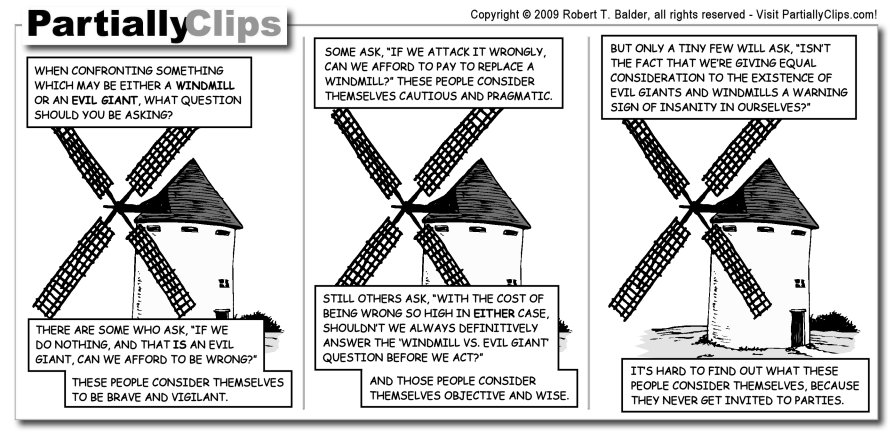Fair and balanced
« previous post | next post »
The latest Partially Clips (click on the image for a larger version):
They don't get onto the news broadcasts much either.
February 20, 2009 @ 10:05 pm · Filed by Mark Liberman under Language and politics
« previous post | next post »
The latest Partially Clips (click on the image for a larger version):
They don't get onto the news broadcasts much either.
February 20, 2009 @ 10:05 pm · Filed by Mark Liberman under Language and politics
Powered By WordPress

Mark F. said,
February 20, 2009 @ 10:19 pm
Well, the Fox News crowd probably thinks this is a parable about global warming.
Mark Liberman said,
February 20, 2009 @ 11:04 pm
Mark F: Well, the Fox News crowd probably thinks this is a parable about global warming.
My first thought was evolution. But it would fit a lot of issues, right across the political spectrum. The problem is that one person's windmill may be another's evil giant.
Erik R. said,
February 21, 2009 @ 3:48 am
Nah. Occam's Razor is never used seriously by both sides of an argument. While a Creationist might attempt to say that "God did it" is not an extraordinary claim, I think they could be convinced that it is. After all, aren't supernatural and extraordinary sort of synonyms?
Great comic. I love it when great metaphors survive centuries.
Ran Ari-Gur said,
February 21, 2009 @ 1:44 pm
@Erik R.: I disagree. Occam's Razor is about the amount of additional speculation between {what you know to be true} and {what your explanation requires to be true}. For someone who knows/"knows" (with or without scare-quotes, take your pick) that G-d created the Universe, it doesn't take so much additional speculation to explain the current state of existence as the result of minimal change after a fully-formed recent Creation. (But obviously plenty of Creationists do believe in Evolution, so even a priori belief in Creation doesn't have to Occam's-Razor-out everything.)
Bob Moore said,
February 21, 2009 @ 2:57 pm
Clearly Robert Balder is a Baysean. He is reminding us that we should consider the prior probabilities of evil giant and windmill. And he is also right that Bayseans don't seem to get invited to parties very much :-)
Mark Johnson said,
February 21, 2009 @ 4:04 pm
I was about to say Bayesian, but I see Bob beat me to it!
Mark
NG Carter said,
February 24, 2009 @ 6:01 am
I thought it was obvious that he was making a brilliant restatement of Pascal's Wager.
Mark Liberman said,
February 24, 2009 @ 6:44 am
@NG Carter: Your interpretation (Pascal's Wager) and Bob and Mark's interpretation (Bayesian inference) are not so far apart. If you read the Rev. Bayes' posthumous "Essay towards solving a Problem in the Doctrine of Chances", you'll find passages like this one:
(Note that this is not the way that the letters P — and N — would be used in a modern discussion.)